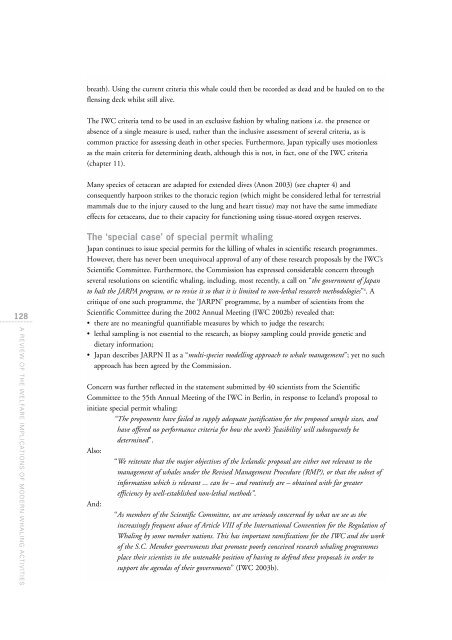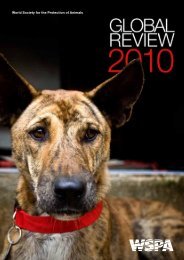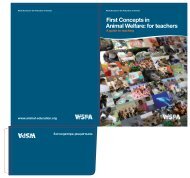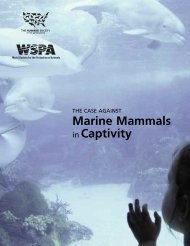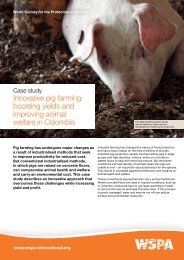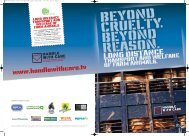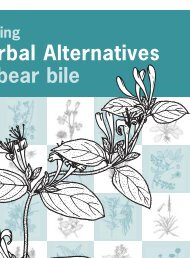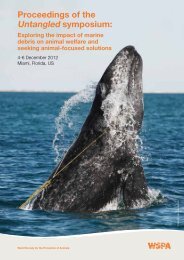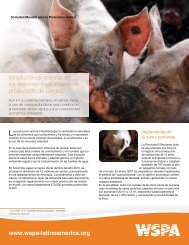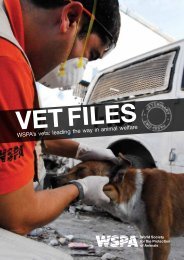these kills take place (see chapter 8). The significance of these variables <strong>and</strong> the inadequacies of themethods used result in the poor TTDs <strong>and</strong> IDRs that are commonly reported (see chapter 6).The proximity of the vessel <strong>and</strong> the gunner to the whale is variable <strong>and</strong> is often far from optimal.The optimal distance for euthanasing a large cetacean, as demonstrated during the euthanasia ofstr<strong>and</strong>ed cetaceans, is likely to be no more than an arm’s length. During many whaling operations,the gunner must aim at a moving target, surrounded by a moving sea <strong>and</strong> from a moving platform(chapter 8).There is also growing concern that the active pursuit of whales, may force the escaping cetacean toundertake a degree of exertion for which it is not evolutionarily adapted. This may induce what isreferred to as ‘exertional myopathy’, which may manifest as lethal or sub-lethal disease ordysfunction. Thus, whales that are pursued, but avoid being struck <strong>and</strong> eventually evade capture,may suffer as a result of this pursuit. It is also possible that some may die as a result of inducedexertional myopathy.As a result, even if more efficient <strong>and</strong> more species-specific technology could be developed for killingcetaceans on the high seas, the fact that there may always be a percentage of whales that are eitherstruck <strong>and</strong> lost, or that are pursued <strong>and</strong> lost without being struck, would remain a serious welfareproblem.Problems associated with the specific biology of whalesAs described in chapter 4, cetaceans are unusual animals <strong>and</strong> their biology raises ethical as well aswelfare concerns. We still know relatively little about many whale species. This lack of knowledgeincludes a poor underst<strong>and</strong>ing of where many populations begin <strong>and</strong> end, <strong>and</strong> even of basic cetaceanbiology <strong>and</strong> behaviour. Where knowledge is adequate, it is apparent that some species – for example,orcas, sperm whales <strong>and</strong> pilot whales – have highly developed social structures <strong>and</strong> there is a stronginterdependence between individuals. Skills <strong>and</strong> specialisations can be seen to pass betweengenerations <strong>and</strong>, these animals can be said to have cultures as well as societies. This means that theremoval of individuals by hunting may have a significant impact on the wider population becausetheir potential to pass on knowledge (as well as genetic diversity) is removed. Similarly, the removalof entire groups or populations may mean the removal of entire ways of life or cetacean cultures.WHALING & WELFARE127Because they are adapted to an exclusively marine way of life (cetaceans being the larger of only twoorders of mammals that complete their lifecycles in the water), these animals also have a number ofphysiological <strong>and</strong> anatomical peculiarities that further compound welfare issues.Determining when whales are deadPerhaps the greatest concern relating to the welfare of hunted cetaceans is the fact that the currentcriteria used for determining death in cetaceans are inadequate (Butterworth et al. 2003) (see chapter11). It is likely that whales suffer more prolonged deaths than the current data suggest, but until ascientifically proven means of determining death in cetaceans is established, individual whales may bedeclared dead while they are still alive. In some cases, it is possible they may even die while beingwinched aboard a processing vessel. It is also possible that an individual whale could be paralysed bythe harpoon strike <strong>and</strong> may initiate a physiological dive response, in an attempt to escape this attack.Such an animal would then present as ‘motionless’ <strong>and</strong> not breathing (since it may be holding its
eath). Using the current criteria this whale could then be recorded as dead <strong>and</strong> be hauled on to theflensing deck whilst still alive.The IWC criteria tend to be used in an exclusive fashion by whaling nations i.e. the presence orabsence of a single measure is used, rather than the inclusive assessment of several criteria, as iscommon practice for assessing death in other species. Furthermore, Japan typically uses motionlessas the main criteria for determining death, although this is not, in fact, one of the IWC criteria(chapter 11).Many species of cetacean are adapted for extended dives (Anon 2003) (see chapter 4) <strong>and</strong>consequently harpoon strikes to the thoracic region (which might be considered lethal for terrestrialmammals due to the injury caused to the lung <strong>and</strong> heart tissue) may not have the same immediateeffects for cetaceans, due to their capacity for functioning using tissue-stored oxygen reserves.128A REVIEW OF THE WELFARE IMPLICATIONS OF MODERN WHALING ACTIVITIESThe ‘special case’ of special permit whalingJapan continues to issue special permits for the killing of whales in scientific research programmes.However, there has never been unequivocal approval of any of these research proposals by the IWC’sScientific Committee. Furthermore, the Commission has expressed considerable concern throughseveral resolutions on scientific whaling, including, most recently, a call on “the government of Japanto halt the JARPA program, or to revise it so that it is limited to non-lethal research methodologies” 4 . Acritique of one such programme, the ‘JARPN’ programme, by a number of scientists from theScientific Committee during the 2002 Annual Meeting (IWC 2002b) revealed that:• there are no meaningful quantifiable measures by which to judge the research;• lethal sampling is not essential to the research, as biopsy sampling could provide genetic <strong>and</strong>dietary information;• Japan describes JARPN II as a “multi-species modelling approach to whale management”; yet no suchapproach has been agreed by the Commission.Concern was further reflected in the statement submitted by 40 scientists from the ScientificCommittee to the 55th Annual Meeting of the IWC in Berlin, in response to Icel<strong>and</strong>’s proposal toinitiate special permit whaling:“The proponents have failed to supply adequate justification for the proposed sample sizes, <strong>and</strong>have offered no performance criteria for how the work’s ‘feasibility’ will subsequently bedetermined”.Also:“We reiterate that the major objectives of the Icel<strong>and</strong>ic proposal are either not relevant to themanagement of whales under the Revised Management Procedure (RMP), or that the subset ofinformation which is relevant ... can be – <strong>and</strong> routinely are – obtained with far greaterefficiency by well-established non-lethal methods”.And:“As members of the Scientific Committee, we are seriously concerned by what we see as theincreasingly frequent abuse of Article VIII of the International Convention for the Regulation ofWhaling by some member nations. This has important ramifications for the IWC <strong>and</strong> the workof the S.C. Member governments that promote poorly conceived research whaling programmesplace their scientists in the untenable position of having to defend these proposals in order tosupport the agendas of their governments” (IWC 2003b).
- Page 5 and 6:
ForewordWhales are highly evolved a
- Page 7:
1 Executive SummaryThis review exam
- Page 11 and 12:
2 A background to whalingPhilippa B
- Page 13 and 14:
y the weapon’s enormous recoil, w
- Page 15 and 16:
Japan currently whales in the Antar
- Page 17 and 18:
Otto, K. 1997. Animal Pain Behaviou
- Page 19 and 20:
Protecting the welfare of animals i
- Page 21 and 22:
Toothed whales (Odontoceti)Toothed
- Page 23 and 24:
Social behaviourMother-calf pairsOn
- Page 25 and 26:
to store and pass on information to
- Page 27 and 28:
Communication in great whalesThe mo
- Page 29:
Self-awarenessOne of the most compe
- Page 32 and 33:
J.G.M. Thewissen), pp. 158-162. Aca
- Page 34 and 35:
Whitehead, H., Waters, S. and Lyrho
- Page 36 and 37:
humanitarian purposes the time take
- Page 38 and 39:
Welfare and the modern IWCFrom 1980
- Page 40 and 41:
1996 UK proposes guidelines for col
- Page 42 and 43:
Section TwoWhale killing6 Commercia
- Page 44 and 45:
Table 1 Commercial, special permit
- Page 46 and 47:
It can be argued that the figures f
- Page 48 and 49:
Since struck and lost whales can in
- Page 50 and 51:
equipment to Russian subsistence wh
- Page 52 and 53:
This is the time from the throwing
- Page 54 and 55:
Table 3 Aboriginal Subsistence Whal
- Page 56 and 57:
International Aid For Korean Animal
- Page 58 and 59:
29 In Resolution 1999-1, the IWC no
- Page 60 and 61:
For example, Greenland and the Faro
- Page 62 and 63:
the past they made an important con
- Page 64 and 65:
however, has been made on the exten
- Page 66 and 67:
hunt indicate that the whales are s
- Page 68 and 69:
8 Weather, sea condition and shipmo
- Page 70 and 71:
chance of fog decreases from 15 to
- Page 72 and 73:
experienced in December, or y could
- Page 74:
9 The potential stress effects ofwh
- Page 77 and 78:
Both chase and pursuit cause stress
- Page 79 and 80:
and manifest in a series of lethal
- Page 81 and 82: Ridgeway, S. H. (1966). Dall porpoi
- Page 83 and 84: 10 Euthanasia of cetaceansPhilippa
- Page 85 and 86: for the task. The correct target ar
- Page 87 and 88: whales the size of minke whales (Ø
- Page 89 and 90: 11 Review of criteria for determini
- Page 91 and 92: It is apparent from Figure 1, that,
- Page 93 and 94: interpreted criteria, comparisons o
- Page 95 and 96: 90A REVIEW OF THE WELFARE IMPLICATI
- Page 97 and 98: 12 A comparison betweenslaughterhou
- Page 99 and 100: include levels of premature mortali
- Page 101 and 102: the emphasis during some whaling op
- Page 103 and 104: affect an immediate and thereby law
- Page 105 and 106: Table 1 Animal welfare and the Sche
- Page 107 and 108: CIWF Trust, 2002. Farm Assurance Sc
- Page 109 and 110: 13 Ethics and whaling under special
- Page 111 and 112: Table 1. Consideration of the 3Rs i
- Page 113 and 114: skin samples, without the need for
- Page 115 and 116: IWC (2001) Report of the Scientific
- Page 117 and 118: Whales and the lawCetaceans (and wh
- Page 119 and 120: scientific and technical committees
- Page 121 and 122: ASCOBANS came into force in 1994. F
- Page 123 and 124: The Treaty of the Panama Canal, ena
- Page 125 and 126: 2 As a result, their need for prote
- Page 127 and 128: law says, but also the extent to wh
- Page 129 and 130: 15 Whaling and welfarePhilippa Brak
- Page 131: commercial whaling. Times to death
- Page 135 and 136: possibility of establishing a simil
- Page 137 and 138: international customary law and exi
- Page 139 and 140: 16 Summary of conclusionsModern day
- Page 141 and 142: Glossary136A REVIEW OF THE WELFARE
- Page 143 and 144: 138A REVIEW OF THE WELFARE IMPLICAT
- Page 145 and 146: Appendix IIColour plates©Mark Voti
- Page 147 and 148: 142A REVIEW OF THE WELFARE IMPLICAT
- Page 149 and 150: Figure 13. Processing minke whales


